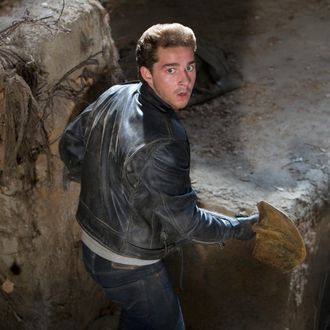
Not everything about the new Indiana Jones film, Dial of Destiny, is elegant. Its opening sequence takes place in 1945, which means that rather than looking at Harrison Ford’s actual face, we must instead gaze at his digitally de-aged visage for 20 minutes. The action scenes are choppier than they were when Steven Spielberg was behind the camera, and there’s an unfortunate overabundance of CGI imagery. Give me back the days when Hollywood melted Nazi skulls the way God intended — with alginate and red gelatin.
However, there’s no denying the elegance with which the film ties up one of the franchise’s most uncomfortable loose ends. In the run-up to Dial of Destiny, I wondered how the film would deal with the problem of Shia LaBeouf’s Mutt Williams, the long-lost son of Indy introduced in 2008’s Kingdom of the Crystal Skull. Intended as a 1950s rebel in the Brando mold, Mutt was derided by fans and critics alike; The Village Voice’s Robert Wilonsky dubbed him “The Mild One.” If that weren’t enough, allegations of domestic violence have since made LaBeouf more or less uncastable in major studio movies. (He is next set to appear in Francis Ford Coppola’s self-financed Megalopolis.) And yet, Indiana Jones isn’t a franchise to rewrite canon willy-nilly. If Indy had a son in the fourth movie, that son will still exist in the fifth one. What’s a self-respecting tentpole to do?
Turns out, the way Dial of Destiny handles the issue is so perfect I couldn’t help but chuckle when the movie got around to revealing what happened to Mutt. Read no farther if you don’t want to be spoiled …
Mutt dies off-screen in Vietnam!
Yes, that’s right: Mutt Williams receives the ultimate write-off from ’60s-set period pieces, the hand-wave-iest hand-wave in postwar fiction. The only way Dial of Destiny could have given him a more ignoble fate would have been to reveal that, like Neidermeyer in Animal House, Mutt was killed by his troops. (Since we’re told Mutt was an enlisted man, and his death apparently took place before 1969, the year “fragging” really got going, he was probably spared that embarrassment. Place your bets on whether he died at Khe Sanh or Ia Drang.)
It’s a killer punch line for a joke of a character, but against all odds, the film finds a way to make Mutt’s absence something more than a clever bit of behind-the-scenes problem-solving. You see, it was Mutt’s death that caused the breakdown of Indy’s marriage and threw him into the depressive slump we meet him in at the start of the film. Credit must go to Harrison Ford, who delivers the news of Mutt’s demise with genuine sorrow: Even if Mutt didn’t mean much to Indiana Jones fans, the emotions of Ford’s face insist he still meant something to Indiana Jones. No CGI necessary.


